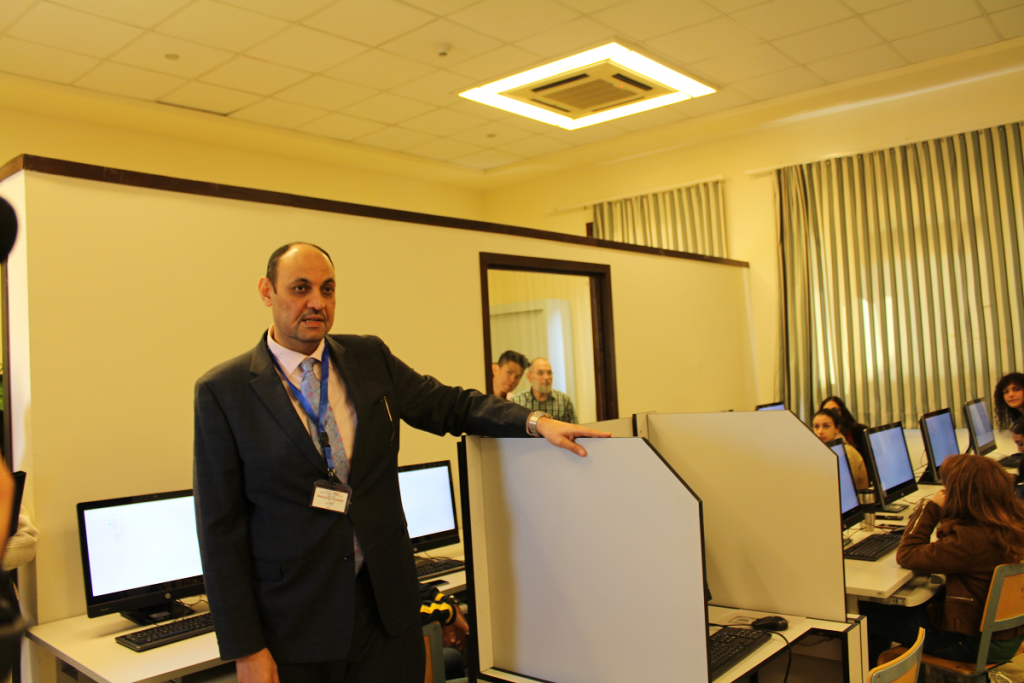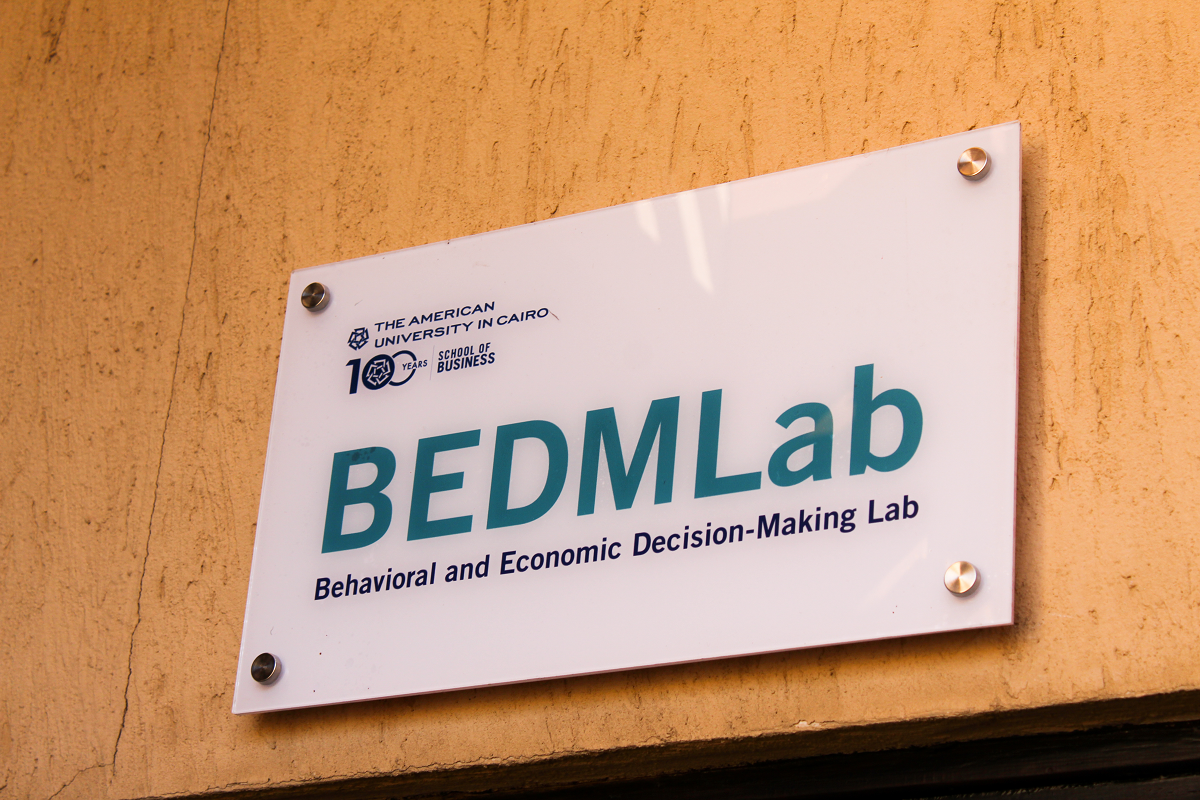On December 4, the AUC School of Business launched its newest research facility, the Behavioral and Economic Decision-Making Lab (BEDMLab), being the first of its kind in North Africa and the second in the Arab region.
The lab officially commenced operations during the “Behavioral Economic Solutions for Egypt 2019” conference hosted by AUC; the first conference on behavioral economics to ever be held in Egypt.
The new lab’s director Mohamed El-Komi, an associate professor of economics at AUC, attended the event to speak about behavioral economics and inaugurate the BEDMLab.

Photo: Tareq Selim/Business Forward
What is behavioral economics and how does it work?
It’s simply the “study of psychology as it relates to the economic decision-making processes of individuals and institutions,” according to Investopedia.
Speaking to Business Forward, El-Komi said that behavioral economics is about “applying psychology, neuroscience, and behavioral sciences on economics.”
Kate MacLeod, an associate at Ideas42, a US-based behavioral sciences lab which started at Harvard University, was also in attendance to bring their expertise in the field.
“Behavioral science [is] about the decisions and actions that people have to take to reach optimal outcomes. A lot of what we’re talking about is how there’s a lot of these underlying decisions and actions that individuals have to take to reach optimal outcomes, whether it be in policies or in certain programmes that they’re a part of. Some of these underlying decisions and actions may hinder people from reaching those optimal outcomes, for reasons that aren’t immediately apparent. So we try to understand those underlying reasons to either better design programmes or policies, or just design small, low cost interventions that can help people reach these optimum outcomes and take that last step between deciding that they want to do something and actually following through,” MacLeod said.
What does a behavioral and economic decision-making lab do?
Researchers at a lab of this kind identify key behavioral problems within a certain context, which could be individuals on the societal level, entrepreneurs, businesses, organizations, institutions, and government. These problems could already be known or be discovered through field research. They are then fleshed out and analyzed to identify all, if not most, of their characteristics to build as full a picture as possible of these behavioral problems.
Several frameworks for interventions are then designed with the intention of eliminating or changing these behaviors in a manner which produces a more positive outcome for the intended beneficiaries. These designs are then tested on a small scale in the field. The lab then measures and analyses the results of the different intervention schemes to discover which ones were the most effective and beneficial.
Afterwards, the most successful design can be scaled up by spreading awareness of it to the broader target group. Additionally, it can also inform an evidence-based policy recommendation for a relevant entity to adopt.
What’s the significance of a behavioral economics lab in Egypt and the MENA region?
Despite being the second of its kind in the Arab world, the BEDMLab at AUC is set to conduct research and work that has never been done before in the region, according to El-Komi. The Arab world’s other BEDM lab is based at NYU Abu Dhabi, and due to its small and atypical population, El-Komi believes their research doesn’t contribute much to the field. “The first one is NYU Abu Dhabi’s but it’s not very functional because it’s a very small university. Only 3000 students and it’s not your typical sample to the people. There’s not much research coming from there. So here we hope [AUC’s] will be more engaged,” he said.
The groundwork for AUC’s BEDMLab has actually already been in the works for 10 years. El-Komi added “the community have already been doing field experiments here in Egypt since my PhD in 2009.”
The problem with experimental economics labs such as this one is that they are grossly over represented in W.E.I.R.D countries. Dr Chaning Jang, the chief strategy officer and vice president of the Busara Center for Behavioral Economics based in Kenya, came to discuss how behavioral decision-making labs should function in developing countries. He revealed the term which stands for Western Educated Industrialized Rich and Democratic.
Jang told Business Forward: “The idea there is that most of the research that is done in a lot of the social sciences comes from either professors or especially subjects from those places. And I think we’ve seen empirically that the way that they behave isn’t always the way that people in non-W.E.I.R.D regions behave.”
Speaking about the significance of BEDMLab at AUC, El-Komi said: “There are very few experimental economics labs in non-W.E.I.R.D countries. There are only 18 out of 252 labs in non-W.E.I.R.D countries.”
What will BEDMLab at AUC be doing then?
According to El-Komi, there will be three main domains that they’ll be working on: “One is improving public policy by doing capacity building and designing policies for the government. A second is for organizations whether they are businesses or NGOs to help them improve their customer relationships, improve their resources, management styles. And the third one is, of course, academic, doing research collaboration with other people and the international community and teaching our students using experiential learning, because when you use experiments in teaching, when you do it yourself, you really learn it.”
One policy area he believes the new lab will especially help improve in Egypt is tackling poverty. Currently, the lab is already working on a project about stereotyping in the workplace, specifically with regards to people of different religions and differing levels of religiosity. The research is being carried out in the United Kingdom, and on people from predominantly Christian countries in addition to Egypt.
What should a BEDM lab based in a country like Egypt consider?
Jang spoke extensively about the multitude of issues that BEDM labs based in developing and emerging economies must consider in their research and the conclusions they draw from their findings.
One of the key things he mentioned was context. One lab’s own designs and theories reached through their findings in a particular city cannot be replicated in another. This is especially the case with labs based in W.E.I.R.D countries, thanks to their very different social dynamics. But even labs based in different cities in the Global South shouldn’t replicate each other’s designs and recommendations.
“The range of context is really important, both cultural [and] religious, but also the place and those are kind of the hard things to feel. Even stepping off the plane, I can tell that this is a different place than when I stepped off the plane in Dar Salaam. This is just one of the cities in Egypt. Every place needs a lab or at least a lab mindset to be able to explore the context of that place and then to be able to build their own kind of theory of behaviour from the grounds up and matching that then with what academia is teaching us. I think it’s where these labs in these local contexts are really important,” Jang said.
In his presentation at the conference, Jang spoke in detail about the importance of context in explaining a lab’s findings in a developing country. Labs must be designed for the local populations they aim to serve. They must also be aware that whatever cultural biases they discover are very local and must be contextualized while maintaining key psychological components. Biases should never be assumed to be universal.
This approach can then help a lab form intervention schemes designed to elicit behavioral biases that will produce more desirable results for the target groups. This is how a lab can use context and bias to help people make decisions.
However, labs should always adopt this same practice with themselves to test for their own internal biases. Jang added how important it will be for AUC’s BEDM lab to assess its own biases in several years’ time.
How can BEDM labs contribute to their local populations, business communities, and economies?
“The Egyptian business community is actually a very important part because people will think only about behavioral interventions in terms of policy but then now, with companies and businesses actually, we can improve the reward system. We can improve many things like competitiveness. We can improve the trust level. We can measure the trust level in a certain organization,” El-Komi said.
According to Jang, a key issue is the disconnect between academia and what actually happens in the real world. “In a perfect world, there should always be a really good synergy between academia, who should be at the cutting edge of science, and the policy or the business case where they’re actualizing things. What happens a lot of times is that academia is pushing at the forefront of some very specific field that the application isn’t going to trickle down for another 20-30 years.”
BEDM labs offer an opportunity to bring academic research and real-world applications closer together.
“I think what’s really exciting about these decision labs or behavioral economics more generally, is that they try to bridge that gap between something really academic but then something really practical. By its very nature, behavioral science is very easy. It’s very intuitive and I think because of that, it allows any person to apply that into their own businesses. A lot of the things we talked about whether it’s present bias or loss aversion, someone that’s running a business today can use those principles in their marketing in the way that they make their own decisions and I think that’s what’s really exciting about that fusion between academia and the real world,” Jang added.
One of the most important features of BEDM labs is their focus on forming and recommending evidence-based policies which will yield highly effective results when scaled up and applied in the field. “I think what’s exciting about behavioral science is it gives you a very easy way to think about evidence building through these labs. In my perfect world, however, using these labs generate[s] real evidence that informs your decision-making, not just a way to kind of confirm what you already believe in, so to speak. I think that’s the biggest promise for development. To really get more people to embrace evidence-based decision-making,” Jang concluded.
Another advantage of the conclusions that such labs reach is that they don’t call for sweeping changes that upend and overhaul the system. Only gradual ones which bring significant rewards and benefits over the long term. “We as behavioral scientists or behavioral economists, we just believe in incremental change. If we can change something little by little, we are very happy to do this. We hope good changes will stick,” El-Komi said.









